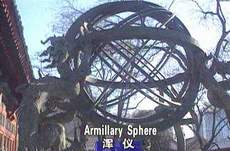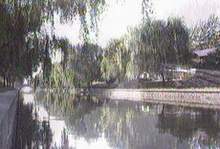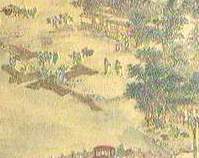 |
|
Guo Shoujing |
| CCTV.COM 2002-11-28 16:11:42 |
|
 Reservoir Lake or Ji Shui Tan in the Xicheng District of Beijing is a spot for morning exercise and public entertainment. This place, however, was a busy port for water transport hundreds of years ago. Here once worked the Yuan-dynasty scientist Guo Shoujing who made great contribution to the water conservancy for Beijing. Reservoir Lake or Ji Shui Tan in the Xicheng District of Beijing is a spot for morning exercise and public entertainment. This place, however, was a busy port for water transport hundreds of years ago. Here once worked the Yuan-dynasty scientist Guo Shoujing who made great contribution to the water conservancy for Beijing.
Guo Shoujing, styled Ruosi, was a native of Xingtai in present-day Hebei Province. He began to study arithmetic and water engineering at the age of 16.
Beijing had always been troubled by insufficient water supply. In 1263, Guo Shoujing set to get water supply for Beijing, then called Dadu, by conducting the water of Yuquan or Jade Spring River. This is the first large-scale exploration of the River in the history. Over the ensuing centuries, the project started by Guo Shoujing remained the most important water source for Beijing.
 To solve the problem of water transportation of grains, Guo Shoujing put forward a programme to conduct water across different river basins, that is, to conduct water from the Baifu Spring at the foot of the Phoenix Hill in Changping County to Wengshan Lake, namely, the present-day Kunming Lake in Summer Palace. The project played an important role in water supply, navigation, irrigation and flood control at that time. By way of Xizhimen Gate the water flowed from Wengshan Lake into the Reservoir Lake which was the terminal of the Great Canal of that time. To its northeast lay the busiest commercial centre of Dadu. To solve the problem of water transportation of grains, Guo Shoujing put forward a programme to conduct water across different river basins, that is, to conduct water from the Baifu Spring at the foot of the Phoenix Hill in Changping County to Wengshan Lake, namely, the present-day Kunming Lake in Summer Palace. The project played an important role in water supply, navigation, irrigation and flood control at that time. By way of Xizhimen Gate the water flowed from Wengshan Lake into the Reservoir Lake which was the terminal of the Great Canal of that time. To its northeast lay the busiest commercial centre of Dadu.
Knowledge in astronomy and geography was a touchstone for a good scientist in ancient China. Guo Shoujing scored great achievements in astronomical study. The most notable of his accomplishments is his calendar. In order to facilitate the development of the calendar, the Yuan government set up the Observatory of Dadu, the largest in the world of that time. In the observatory Guo Shoujing invented, renovated and improved many astronomical instruments. Due to elapse of long time, the original instruments left by Guo Shoujing have been lost. We can only have a glimpse of several of his instruments from the duplicates produced in later times.
The most important instrument was the simplified armillary sphere. It was used to observe the positions of celestial bodies. The simplified armillary sphere has been regarded as a milestone in the development of astronomical instruments.
 One "year" in Guo Shoujing's calendar has only an error of 26 seconds compared with the earth's actual yearly round. His calendar was used for 364 years. Of all ancient calendars, his was used for the longest time. Its completion was 301 years earlier than the Gregorian Calendar that was published in 1582 by the Roman Pope Gregory XIII. One "year" in Guo Shoujing's calendar has only an error of 26 seconds compared with the earth's actual yearly round. His calendar was used for 364 years. Of all ancient calendars, his was used for the longest time. Its completion was 301 years earlier than the Gregorian Calendar that was published in 1582 by the Roman Pope Gregory XIII.
To commemorate the 750th anniversary of Guo Shoujing's birth, in 1981 the International Astronomical Union named a circular mountain on the moon and the minor planet number 2010 in the solar system after Guo. Guo Shoujing who enriched the human scientific civilisation with his many-sided achievements is a giant admired by his posterity.
|
|
Editor: Inner Wu CCTV.com
|
|
|
|
|
|
 |









